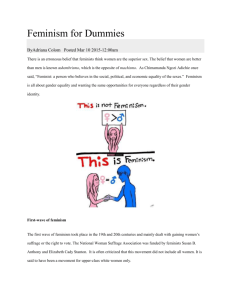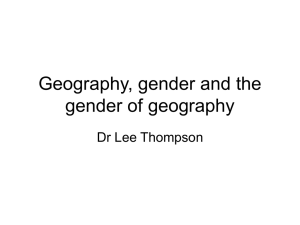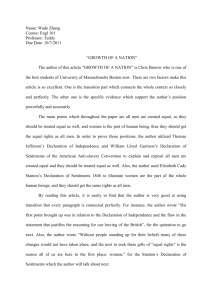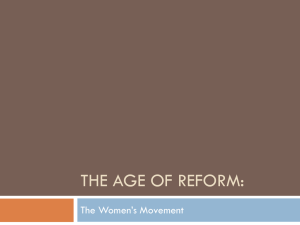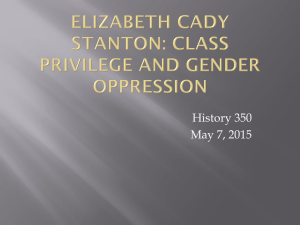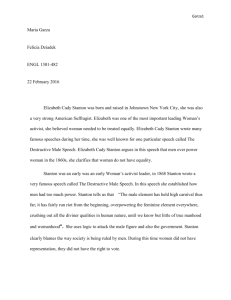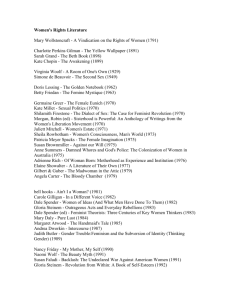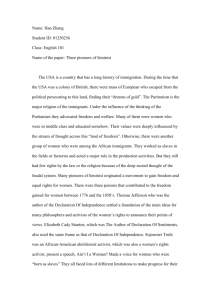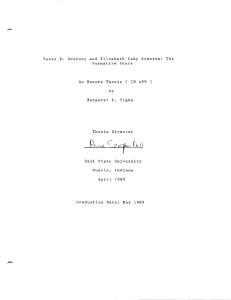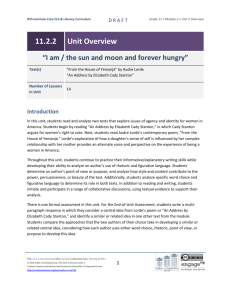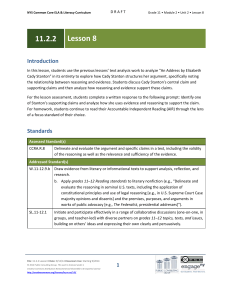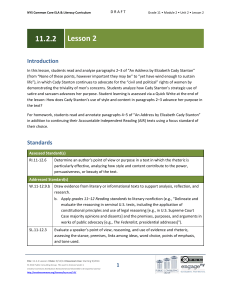The Betrayal of Modern Women
advertisement
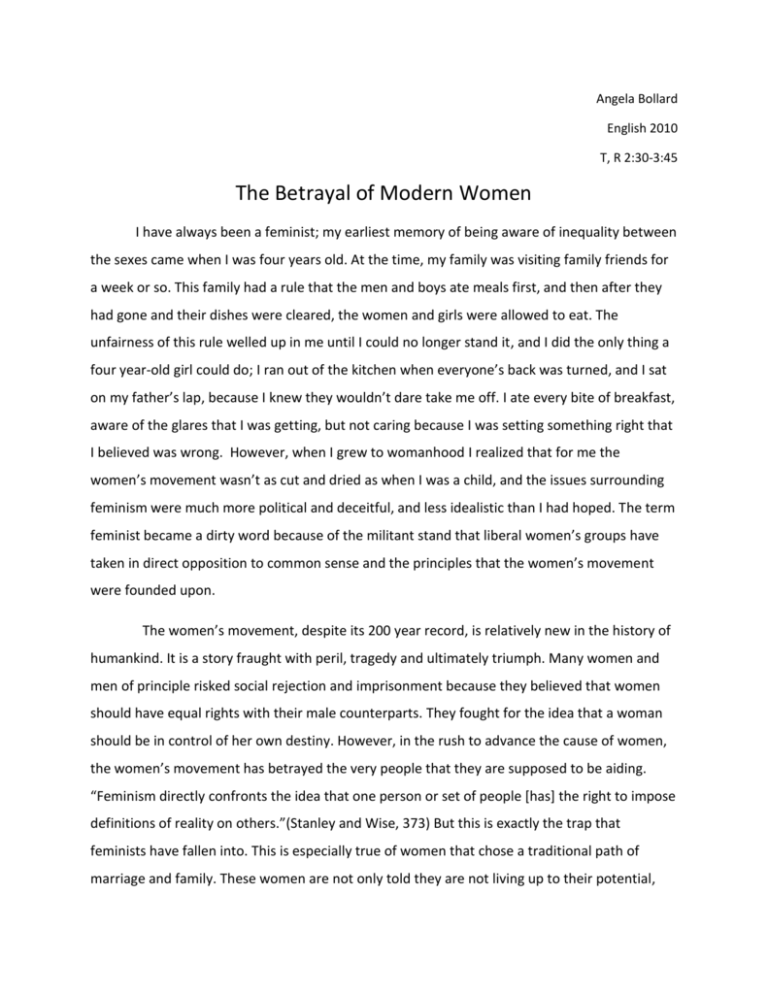
Angela Bollard English 2010 T, R 2:30-3:45 The Betrayal of Modern Women I have always been a feminist; my earliest memory of being aware of inequality between the sexes came when I was four years old. At the time, my family was visiting family friends for a week or so. This family had a rule that the men and boys ate meals first, and then after they had gone and their dishes were cleared, the women and girls were allowed to eat. The unfairness of this rule welled up in me until I could no longer stand it, and I did the only thing a four year-old girl could do; I ran out of the kitchen when everyone’s back was turned, and I sat on my father’s lap, because I knew they wouldn’t dare take me off. I ate every bite of breakfast, aware of the glares that I was getting, but not caring because I was setting something right that I believed was wrong. However, when I grew to womanhood I realized that for me the women’s movement wasn’t as cut and dried as when I was a child, and the issues surrounding feminism were much more political and deceitful, and less idealistic than I had hoped. The term feminist became a dirty word because of the militant stand that liberal women’s groups have taken in direct opposition to common sense and the principles that the women’s movement were founded upon. The women’s movement, despite its 200 year record, is relatively new in the history of humankind. It is a story fraught with peril, tragedy and ultimately triumph. Many women and men of principle risked social rejection and imprisonment because they believed that women should have equal rights with their male counterparts. They fought for the idea that a woman should be in control of her own destiny. However, in the rush to advance the cause of women, the women’s movement has betrayed the very people that they are supposed to be aiding. “Feminism directly confronts the idea that one person or set of people [has] the right to impose definitions of reality on others.”(Stanley and Wise, 373) But this is exactly the trap that feminists have fallen into. This is especially true of women that chose a traditional path of marriage and family. These women are not only told they are not living up to their potential, but they are simpleminded and stupid because if they understood “correctly” they would surely come to the same conclusions. They are also called traitors to “the cause” for simply following the path that they feel is best for them. On a stifling July day in 1848, the first women’s rights convention was held in Seneca Falls, New York to discuss women’s role in society. Although the question of women’s rights had been raised in other countries, this was the first meeting of its kind in America. At the time women were completely dependent on the whims and caprices of men. A woman could conceivably go from her father’s house, to her husband’s house (because, of course, she couldn’t own property) and not be allowed to make any major decisions whatsoever in the course of her entire life. Women had no say about the formation of laws, but were expected to obey them, in a divorce they had no rights to their own children, and were barred from entering colleges and universities. A Declaration of Rights and Sentiments was presented at the convention and became the foundational document for the women’s movement. The Declaration emulates the founding document of the United States of America, The Declaration of Independence, and in part states “We hold these truths to be self-evident: that all men and women are created equal; that they are endowed by their Creator with certain inalienable rights; that among these are life, liberty, and the pursuit of happiness; that to secure these rights governments are instituted, deriving their just powers from the consent of the governed. Whenever any form of government becomes destructive of these ends, it is the right of those who suffer from it to refuse allegiance to it, and to insist upon the institution of a new government, laying its foundation on such principles, and organizing its powers in such form, as to them shall seem most likely to affect their safety and happiness.”(Stanton, Declaration, Para. 2.) Despite a passionate speech by Frederick Douglass in favor of suffrage, only 100 of the 300 participants signed the Declaration. The early suffrage movement was inexorably linked with the abolition of slavery. Many women that supported their own rights could not condone withholding them from their fellow human beings. Because the ideas were so new, public opinion was against both. Therefore, they had to band together to survive. However, proponents of both suffrage and abolition differed on their views of how and in what order this would come to pass. Activists like Elizabeth Cady Stanton, Susan B. Anthony, and Lucy Stone disagreed on certain points and came to different conclusions. Despite her abolitionist views, Elizabeth Cady Stanton deigned to support the Fourteenth and Fifteenth Amendments to the United States Constitution because she was opposed to giving additional legal protection to black men while continuing to deny black and white women the same privilege. Susan B. Anthony also opposed the amendments to the Constitution for the same reason but opposed more radical reforms advocated by Stanton. However, Lucy Stone supported the amendment and broke off from Stanton and Anthony because of it. (Gordon, Vol. II, p. 567) But finally after years of petition gathering, appeals to Congress, picketing, and rallies, and although most of the women that had championed the cause had died, the Nineteenth Amendment giving women the right to vote was passed into law on August 18, 1920. However, once the movement attained their goal of voting rights for women they had to justify their continued existence. So they pushed the limits of societal norms further and further until they created an androgynous third sex that has very strict rules that contradict each other. For example the name “feminist” contradicts feminist beliefs; as the root of the word implies femininity and feminists don’t like to accentuate femininity. Another contradiction is motherhood. Most feminists see motherhood as oppressive, and a waste of talent, yet in 2007 Senator Barbara Boxer informed the then Secretary of State Condoleezza Rice that she shouldn’t have a say in war policy because she is childless. (Rice, 110th Congress) These contradictions become especially poignant because radical feminist organizations like the National Organization for Women believe that they have the right to dictate behaviors and lifestyle choices to millions of women, not only in the United States, but around the world. And since the media only covers the radical minority, women with more rational views are not listened to. In the late 80’s and early 90’s, it was discovered that China was forcing women to abort healthy babies in accordance with their one-child rule. Medical units would, and still do, travel to the outer provinces with ultrasound machines and physically force mothers to abort babies that weren’t “allowed”. Gao Xiaoduan, a former family planning officer with the Chinese government testified in tears before the U.S. House of Representatives, “Once I found a woman who was nine-months pregnant, but did not have a birthallowed certificate. According to the policy, she was forced to undergo an abortion surgery, the baby was born alive, its lips sucking, its limbs stretching,” Xiaoduan said. "A physician injected poison into its skull, and the child died, and it was thrown into the trash can." (Xiaoduan, Congressional Record, Vol. 151, Pt. 4) Yet the former president of the National Organization for Women, Molly Yard, defended the practice, saying “I consider the Chinese government's [population control] policy among the most intelligent in the world. ... It is a policy limited to the heavily overpopulated areas, and it is an attempt to feed the people of China. I find it very intelligent." (Yard, Interview, 1989) She also advocated a similar policy in the United States. Feminism has particularly hit the role of women as mothers in traditional families particularly hard. Feminism assumes that all women wish to be in the workplace and treats those that don’t want to return to the workplace after the birth of their children like aberrations of nature. In the view of the extreme feminists, a woman is to set aside her own wishes regarding her family and hand over the care of her children to others. Because according to them, “It takes a village to raise children”. This leads to the accompanying idea that there is no such thing as “other people’s children”, which allows them to champion all sorts of causes because they’re doing it “for the children”. This also allows government-run agencies more control of what children are taught from an early age in an attempt to keep traditional values from being transmitted from parents to children. There is only one thing wrong with this line of thinking. My child does not belong to the state; he belongs to me and my husband and it is up to us to decide how he will be raised. The state didn’t give birth to him, they did not walk the floors at 3 a.m. when he cried, they did not feed him, and they did not kiss him better when he scraped his knee falling off his bike. If I need help from "the village” I will let them know, but they shouldn’t hold their breath. Women that chose motherhood over careers during their children’s formulative years are not betraying the women’s movement, they are living it. “…what I am doing is preparing the life of the next man who may make the decision on whether some of you receive social security or not. I am aiding in the development of possibly the next great mind that will discover the cure for all cancers or AIDS or a definitive cure for heart attack.” (Motherhood, Raleigh, Para. 25.) Because women now have the right to chose for themselves the path that their lives will take, they should not give it up so a “cause” can feel that it has made progress. Not even to the National Organization for Women. How does this allow women personal freedom to choose for themselves the course that their lives will follow? The answer is, it doesn’t. In allowing the most liberal elements of our society to represent women with their limited view of what feminism and womanhood looks like, we are taking power away from ourselves, and placing it in the hands of those that have their own agendas. These women only want to retain the power that they have, and to increase that power by any means necessary, including selling their sisters down the river to accomplish their goal. I am still a feminist. All women are, whether we see ourselves that way or not. And it is our right and responsibility to build upon the work of those that came before us to choose from the many careers, education opportunities, political prospects, and family options now open to us and live our lives in the way that seems best to each individual woman. Bibliography -Stanley, L., & Wise, S. (1979). Women’s Studies International Quarterly, 2, 359–374. - Stanton, Elizabeth Cady. Declaration of Rights and Sentiments. 20 July 1848. Declaration. Seneca Falls, New York. -Stanton, Elizabeth Cady, Susan B. Anthony, and Ann D. Gordon. The Selected Papers of Elizabeth Cady Stanton and Susan B. Anthony. Vol. II. New Brunswick, NJ: Rutgers UP, 1997. Print. Against an Aristocracy of Sex, 1866 to 1873. -Senate Foreign Relations Committee Hearing, 110th Cong. (2007) (testimony of Condoleezza Rice). Print. - United States. Cong. House. United States Agency for International Development. Congressional Record. 109 Cong., 2nd sess. HR Res. Vol. 151. Washington D.C.: Government Printing Office, 2005. Print. Ser. 4. - Interview by Oprah Winfrey. The Oprah Winfrey Show. ABC. Chicago, Illinois, 6 July 1989. Television. - "Motherhood versus Feminism." Raleigh Tavern Philosophical Society. Web. 16 Nov. 2010. <http://www.raleightavern.org/Rlghtvrn.htm>.


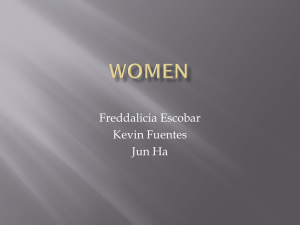

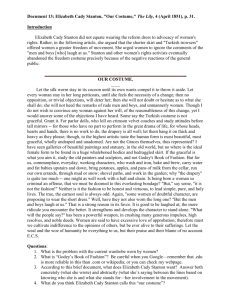
![womens_rights[1]](http://s2.studylib.net/store/data/010014890_1-dbb1785f178ee376274698e7007ca41f-300x300.png)
